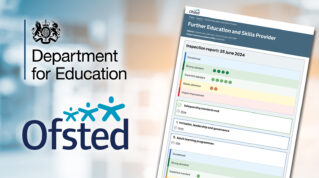Colleges could be forced to change their leaders if Ofsted finds they are failing to meet local skills needs.
The move is part of new reforms to the government’s college oversight framework, refreshed today as Ofsted’s new “report card” inspection model is rolled out.
Overall headline grades have been removed and the watchdog will now grade colleges in up to 16 individual areas on a five-point scale from ‘exceptional’, ‘strong standard’ and ‘expected standard’ to ‘needs attention’ and ‘urgent improvement’.
This shift allows for a “more nuanced understanding of provider performance and enables targeted responses”, the DfE said.
The department’s guidance revealed three tiers of support, led by new regional improvement teams: “Universal support around driving best practice; targeted support where improvement needs are identified; and intensive support – where colleges have hit a trigger for intervention.”
‘Urgent improvement’ consequences
Under the new rules, if Ofsted judges a college’s contribution to meeting skills needs as ‘urgent improvement’, this “may lead to targeted support or the college being placed in intervention”.
If a college is placed into intervention, the FE Commissioner will take over from regional improvement teams and has the power to enforce changes to governance or leadership as well as funding restrictions.
Officials will also place a college into intervention where ‘leadership and governance’ or ‘inclusion’ is judged as ‘urgent improvement’ or where safeguarding is ‘not met’.
Ofsted began judging colleges on how well they were contributing to local skills demands in 2022 through “enhanced inspections”. Until now colleges have been rated along a scale of either ‘strong’, ‘reasonable’ or ‘limited’ for this category, none of which have been used to trigger intervention.
There are seven colleges that made a ‘limited contribution’ to local skills from their latest inspection, according to Ofsted’s inspection data up to August 31, 2025.
Provision-level concerns
Today’s guidance stated that where provision-level evaluation areas are graded as ‘urgent improvement’, this will “normally lead to targeted support or action depending on circumstances”.
The DfE said: “The overarching ambition is to ensure our action is proportionate while upholding high quality standards.
“Any finding of ‘urgent improvement’ may also lead to a college receiving a letter to improve, and an FE Commissioner led improvement review, neither of which would be published. Should there be continued concerns about the college’s capacity to improve then the college could be escalated to intervention.”
Where provider-wide or provision-level evaluation areas are judged as ‘needs attention’, the focus will “normally be on targeted support in some circumstances”.
The DfE said: “For example where a college is ‘needs attention’ across multiple areas or is combined with other finance or governance risks a commissioner improvement review may be triggered. This is most likely to take place after other forms of support have been offered.”
College report cards will list three grades for each provision type; apprenticeships, high needs, programmes for young people and programmes for adults. Each area will get a grade for curriculum, teaching and training; achievement and participation; and development.
Ofsted has committed to monitoring inspections of colleges with any evaluation areas graded as requiring ‘urgent improvement’ or ‘needs attention’ or where safeguarding is ‘not met’.
These monitoring inspections may result in a change to grade for the areas, published through an updated report card. And where there is evidence of decline, Ofsted may decide to carry out a full inspection.
















Your thoughts